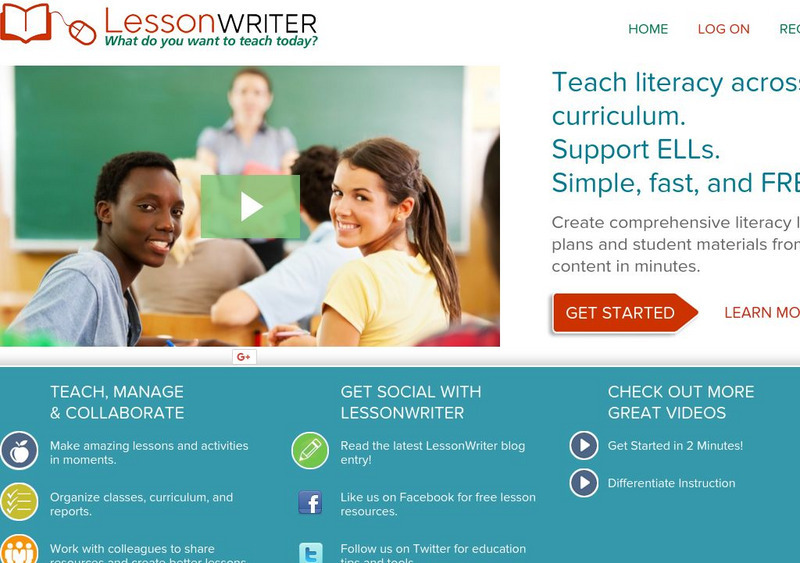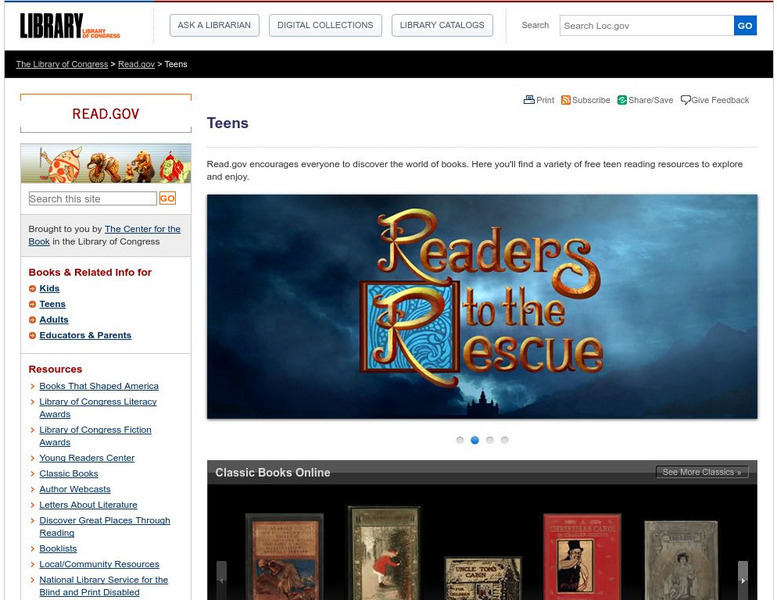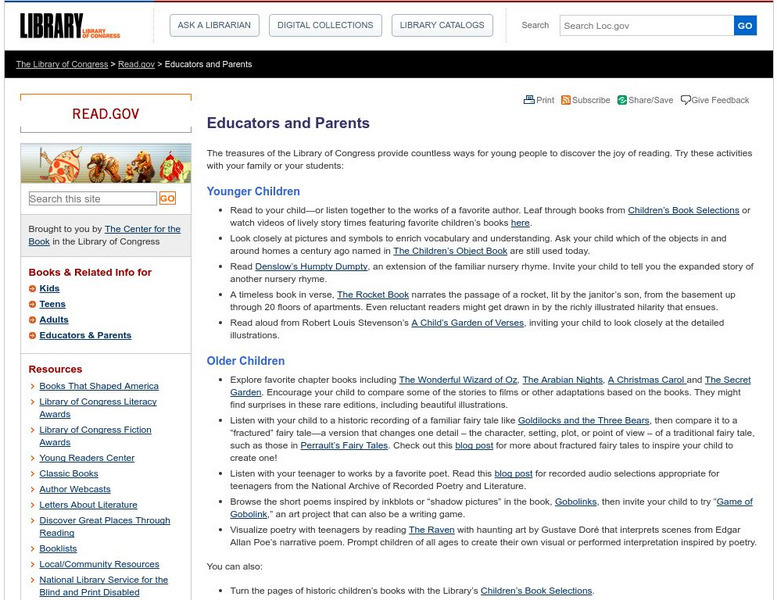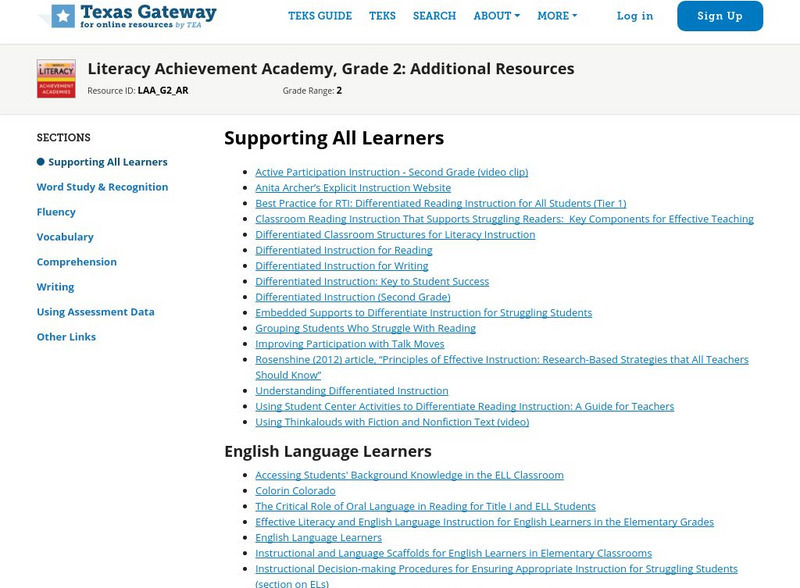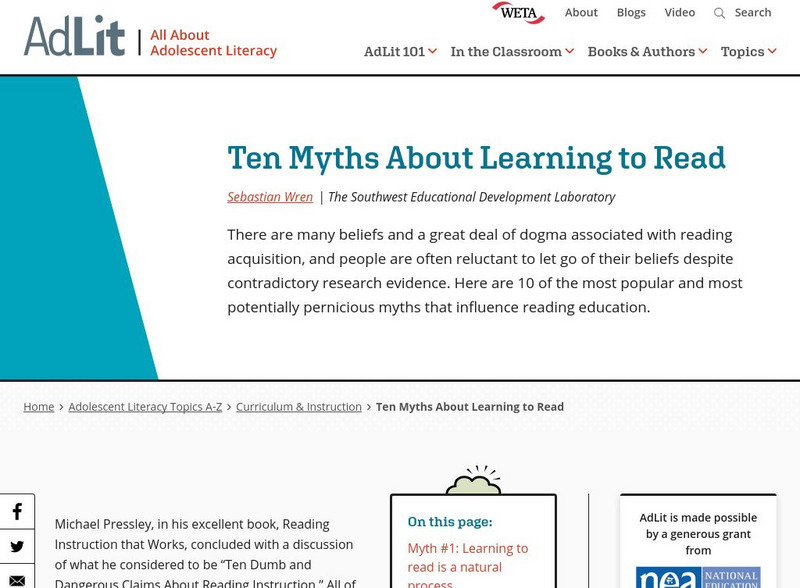University of South Florida
Fcat Express: Teaching Strategies (Reading) [Pdf]
Printable, fifty-five page PDF file of a staff development manual containing strategies for teaching reading. Includes chapters on vocabulary, main ideas and supporting details, author's purpose, chronological order, plot and conflict...
Other
Lesson Writer
Great tool that teachers can use to create a worksheet and lesson from any text. The company points out how this tool can be helpful especially to ESL teachers in that it can focus on key vocabulary and pronunciation.
Library of Congress
Library of Congress: read.gov: Teens
Scanned books, author videos, and more will encourage teens to read, discover new authors, and rediscover classics as they improve literacy skills.
Library of Congress
Library of Congress: read.gov: Educators
Parents and teaches can encourage reading with these author webcasts and links to teaching resources for novels, poetry, writing contests, and more.
Library of Congress
Library of Congress: read.gov: Adults
Scanned books, author videos, and more will encourage adults to read, discover new authors, and rediscover classics.
ReadWriteThink
Read Write Think: Read Write Think
ReadWriteThink offers hundreds of classroom resources for teaching and learning language arts and literacy. Resources range from lesson plans to student interactives, to after-school activities, and professional development.
Annenberg Foundation
Annenberg Learner: Workshops: Teaching Reading 3 5
This instructional workshop provides eight sessions on teaching reading in intermediate classrooms: "Creating Contexts for Learning," "Fluency and Word Study," "Building Comprehension," "Writing," "New Literacies of the Internet,"...
Reading Rockets
Reading Rockets: Reading Topics a to Z
A large collection of articles and resources on reading instruction, including for English language learners. The Teacher Education section includes a complete self-study course on teaching reading and writing.
Texas Education Agency
Texas Gateway: Literacy Achievement Academy, Grade 2: Additional Resources
This is a collection of links to teacher resources for teaching literacy to 2nd graders. It includes reading comprehension, word recognition, vocabulary, fluency, differentiated instruction, and using assessment data.
Reading Rockets
Reading Rockets: Teaching Reading: Classroom Strategies
A collection of effective, research-based classroom strategies to help build and strengthen literacy skills in print awareness, phonological awareness, phonics, fluency, vocabulary, comprehension, and writing.
Reading Rockets
Reading Rockets: Teaching Reading: Expert Interviews
Learn from nationally known researchers and experts in literacy and early education. Topics include phonemic awareness, phonics, vocabulary, spelling, comprehension, writing, summer learning, early childhood education, dyslexia, and more.
AdLit
Ad lit.org: Scaffold Mindful Silent Reading
Help students internalize and routinize their reading comprehension monitoring with this sample lesson.
AdLit
Ad lit.org: The Teaching Moves of a Strategic Teacher
Research demonstrates the effectiveness of the 12 strategic teaching moves described in this article. On any given day in any given classroom, the strategic teacher employs all of these moves - whether with the whole class, a small...
AdLit
Ad lit.org: Effective Reading Programs Grades 6 12: A Best Evidence Synthesis
Many reading programs claim to boost student performance, but how is that measured? Johns Hopkins University examined more than 200 published studies to create this quick guide to programs.
AdLit
Ad lit.org: Recommendations for Improving Adolescent Literacy
In its practice guide Improving Adolescent Literacy: Effective Classroom and Intervention Practices, the Dept. of Education offers five recommendations for increasing the reading ability of adolescents. Those recommendations are...
AdLit
Ad lit.org: Using Student Engagement to Improve Adolescent Literacy
For struggling adolescent readers, creating student interest is as vital as teaching language skills.
AdLit
Ad lit.org: Grouping Students Who Struggle With Reading
There are a variety of grouping formats that have been proven effective for teaching reading to students with learning disabilities: whole class, small group, pairs, and one-on-one. This article summarizes the research and implications...
AdLit
Ad lit.org: Guidelines for Teaching Students to Read and Write Well:six Features
Building on their research in secondary classrooms, the Center on English Learning and Achievement has developed guidelines that describe six essential features of effective literacy instruction and how teachers can implement them.
AdLit
Ad lit.org: Key Literacy Component: Text Comprehension
Text comprehension allows readers to extract or construct meaning from the written word. Students who misread words or misinterpret their meanings are at a disadvantage. Proper instruction can boost students' skills in this key area.
AdLit
Ad lit.org: Ten Myths About Learning to Read
There are many beliefs and a great deal of dogma associated with reading acquisition, and people are often reluctant to let go of their beliefs despite contradictory research evidence. Here are 10 of the most popular and most potentially...
AdLit
Ad lit.org: Dyslexia and High School
An expert shares her observations of a dyslexic student struggling to learn at school. Also included are numerous proven examples of differentiated instruction and accommodations that can help a student to succeed.
AdLit
Ad lit.org: Tips for Reading Tutors
The U.S. Department of Education developed this brief guide for reading tutors. It lists ways that tutoring helps both the learner and the tutor, and provides practical tips that can help tutors be more effective in their work.
AdLit
Ad lit.org: Some Obstacles to Vocabulary Development
A strong vocabulary, both written and spoken, requires more than a dictionary. In fact, it requires an educational commitment to overcoming four obstacles: the size of the task (the number of words students need to learn is exceedingly...
AdLit
Ad lit.org: The Clarifying Routine: Elaborating Vocabulary Instruction
The more a new vocabulary word is associated with ideas from students' own experience, the more likely the word will become well 'networked' and a permanent part of memory. Making these links involves elaborating definitions of new...


![Fcat Express: Teaching Strategies (Reading) [Pdf] Study Guide Fcat Express: Teaching Strategies (Reading) [Pdf] Study Guide](https://d15y2dacu3jp90.cloudfront.net/images/attachment_defaults/resource/large/FPO-knovation.png)
